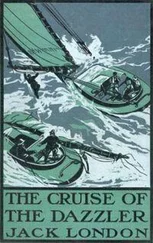Jack London - The Cruise of the Snark
Здесь есть возможность читать онлайн «Jack London - The Cruise of the Snark» весь текст электронной книги совершенно бесплатно (целиком полную версию без сокращений). В некоторых случаях можно слушать аудио, скачать через торрент в формате fb2 и присутствует краткое содержание. Жанр: Классическая проза, Морские приключения, на английском языке. Описание произведения, (предисловие) а так же отзывы посетителей доступны на портале библиотеки ЛибКат.
- Название:The Cruise of the Snark
- Автор:
- Жанр:
- Год:неизвестен
- ISBN:нет данных
- Рейтинг книги:3 / 5. Голосов: 1
-
Избранное:Добавить в избранное
- Отзывы:
-
Ваша оценка:
- 60
- 1
- 2
- 3
- 4
- 5
The Cruise of the Snark: краткое содержание, описание и аннотация
Предлагаем к чтению аннотацию, описание, краткое содержание или предисловие (зависит от того, что написал сам автор книги «The Cruise of the Snark»). Если вы не нашли необходимую информацию о книге — напишите в комментариях, мы постараемся отыскать её.
The Cruise of the Snark — читать онлайн бесплатно полную книгу (весь текст) целиком
Ниже представлен текст книги, разбитый по страницам. Система сохранения места последней прочитанной страницы, позволяет с удобством читать онлайн бесплатно книгу «The Cruise of the Snark», без необходимости каждый раз заново искать на чём Вы остановились. Поставьте закладку, и сможете в любой момент перейти на страницу, на которой закончили чтение.
Интервал:
Закладка:
"I know what you think," the missionary called out to them. "You think plenty tobacco on the schooner and you're going to get it. I tell you plenty rifles on schooner. You no get tobacco, you get bullets."
At last, one man, alone in a small canoe, took the letter and started. Waiting for relief, work went on steadily on the Minota. Her water-tanks were emptied, and spars, sails, and ballast started shoreward. There were lively times on board when the Minota rolled one bilge down and then the other, a score of men leaping for life and legs as the trade-boxes, booms, and eighty-pound pigs of iron ballast rushed across from rail to rail and back again. The poor pretty harbour yacht! Her decks and running rigging were a raffle. Down below everything was disrupted. The cabin floor had been torn up to get at the ballast, and rusty bilge-water swashed and splashed. A bushel of limes, in a mess of flour and water, charged about like so many sticky dumplings escaped from a half-cooked stew. In the inner cabin, Nakata kept guard over our rifles and ammunition.
Three hours from the time our messenger started, a whale-boat, pressing along under a huge spread of canvas, broke through the thick of a shrieking squall to windward. It was Captain Keller, wet with rain and spray, a revolver in belt, his boat's crew fully armed, anchors and hawsers heaped high amidships, coming as fast as wind could drive—the white man, the inevitable white man, coming to a white man's rescue.
The vulture line of canoes that had waited so long broke and disappeared as quickly as it had formed. The corpse was not dead after all. We now had three whale-boats, two plying steadily between the vessel and shore, the other kept busy running out anchors, rebending parted hawsers, and recovering the lost anchors. Later in the afternoon, after a consultation, in which we took into consideration that a number of our boat's crew, as well as ten of the recruits, belonged to this place, we disarmed the boat's crew. This, incidently, gave them both hands free to work for the vessel. The rifles were put in the charge of five of Mr. Caulfeild's mission boys. And down below in the wreck of the cabin the missionary and his converts prayed to God to save the Minota. It was an impressive scene! the unarmed man of God praying with cloudless faith, his savage followers leaning on their rifles and mumbling amens. The cabin walls reeled about them. The vessel lifted and smashed upon the coral with every sea. From on deck came the shouts of men heaving and toiling, praying, in another fashion, with purposeful will and strength of arm.
That night Mr. Caulfeild brought off a warning. One of our recruits had a price on his head of fifty fathoms of shell-money and forty pigs. Baffled in their desire to capture the vessel, the bushmen decided to get the head of the man. When killing begins, there is no telling where it will end, so Captain Jansen armed a whale-boat and rowed in to the edge of the beach. Ugi, one of his boat's crew, stood up and orated for him. Ugi was excited. Captain Jansen's warning that any canoe sighted that night would be pumped full of lead, Ugi turned into a bellicose declaration of war, which wound up with a peroration somewhat to the following effect: "You kill my captain, I drink his blood and die with him!"
The bushmen contented themselves with burning an unoccupied mission house, and sneaked back to the bush. The next day the Eugenie sailed in and dropped anchor. Three days and two nights the Minota pounded on the reef; but she held together, and the shell of her was pulled off at last and anchored in smooth water. There we said good-bye to her and all on board, and sailed away on the Eugenie, bound for Florida Island. {1} {1} {1} To point out that we of the Snark are not a crowd of weaklings, which might be concluded from our divers afflictions, I quote the following, which I gleaned verbatim from the Eugenie's log and which may be considered as a sample of Solomon Islands cruising: Ulava, Thursday, March 12, 1908. Boat went ashore in the morning. Got two loads ivory nut, 4000 copra. Skipper down with fever. Ulava, Friday, March 13, 1908. Buying nuts from bushmen, 1.5 ton. Mate and skipper down with fever. Ulava, Saturday, March 14, 1908. At noon hove up and proceeded with a very light E.N.E. wind for Ngora-Ngora. Anchored in 5 fathoms—shell and coral. Mate down with fever. Ngora-Ngora, Sunday, March 15, 1908. At daybreak found that the boy Bagua had died during the night, on dysentery. He was about 14 days sick. At sunset, big N.W. squall. (Second anchor ready) Lasting one hour and 30 minutes. At sea, Monday, March 16, 1908. Set course for Sikiana at 4 P.M. Wind broke off. Heavy squalls during the night. Skipper down on dysentery, also one man. At sea, Tuesday, March 17, 1908. Skipper and 2 crew down on dysentery. Mate fever. At sea, Wednesday, March 18, 1908. Big sea. Lee-rail under water all the time. Ship under reefed mainsail, staysail, and inner jib. Skipper and 3 men dysentery. Mate fever. At sea, Thursday, March 19, 1908. Too thick to see anything. Blowing a gale all the time. Pump plugged up and bailing with buckets. Skipper and five boys down on dysentery. At sea, Friday, March 20, 1908. During night squalls with hurricane force. Skipper and six men down on dysentery. At sea, Saturday, March 21, 1908. Turned back from Sikiana. Squalls all day with heavy rain and sea. Skipper and best part of crew on dysentery. Mate fever. And so, day by day, with the majority of all on board prostrated, the Eugenie's log goes on. The only variety occurred on March 31, when the mate came down with dysentery and the skipper was floored by fever.
CHAPTER XVI—BECHE DE MER ENGLISH
Given a number of white traders, a wide area of land, and scores of savage languages and dialects, the result will be that the traders will manufacture a totally new, unscientific, but perfectly adequate, language. This the traders did when they invented the Chinook lingo for use over British Columbia, Alaska, and the Northwest Territory. So with the lingo of the Kroo-boys of Africa, the pigeon English of the Far East, and the beche de mer of the westerly portion of the South Seas. This latter is often called pigeon English, but pigeon English it certainly is not. To show how totally different it is, mention need be made only of the fact that the classic piecee of China has no place in it.
There was once a sea captain who needed a dusky potentate down in his cabin. The potentate was on deck. The captain's command to the Chinese steward was "Hey, boy, you go top-side catchee one piecee king." Had the steward been a New Hibridean or a Solomon islander, the command would have been: "Hey, you fella boy, go look 'm eye belong you along deck, bring 'm me fella one big fella marster belong black man."
It was the first white men who ventured through Melanesia after the early explorers, who developed beche de mer English—men such as the beche de mer fishermen, the sandalwood traders, the pearl hunters, and the labour recruiters. In the Solomons, for instance, scores of languages and dialects are spoken. Unhappy the trader who tried to learn them all; for in the next group to which he might wander he would find scores of additional tongues. A common language was necessary—a language so simple that a child could learn it, with a vocabulary as limited as the intelligence of the savages upon whom it was to be used. The traders did not reason this out. Beche do mer English was the product of conditions and circumstances. Function precedes organ; and the need for a universal Melanesian lingo preceded beche de mer English. Beche de mer was purely fortuitous, but it was fortuitous in the deterministic way. Also, from the fact that out of the need the lingo arose, beche de mer English is a splendid argument for the Esperanto enthusiasts.
Читать дальшеИнтервал:
Закладка:
Похожие книги на «The Cruise of the Snark»
Представляем Вашему вниманию похожие книги на «The Cruise of the Snark» списком для выбора. Мы отобрали схожую по названию и смыслу литературу в надежде предоставить читателям больше вариантов отыскать новые, интересные, ещё непрочитанные произведения.
Обсуждение, отзывы о книге «The Cruise of the Snark» и просто собственные мнения читателей. Оставьте ваши комментарии, напишите, что Вы думаете о произведении, его смысле или главных героях. Укажите что конкретно понравилось, а что нет, и почему Вы так считаете.







